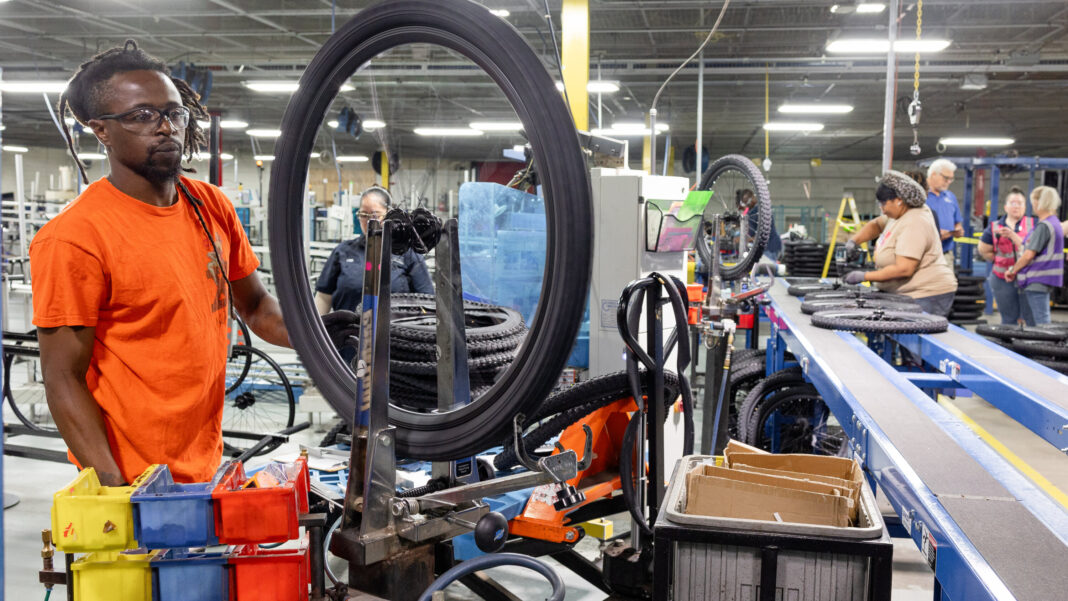President Donald Trump’s 25% tariff on imports from Mexico and Canada, scheduled to kick in Tuesday, will affect not only those two countries but also will have direct implications on Chinese companies.
The Hofusan Industrial Park is a complex about 20 km north of Monterrey, Mexico, and a 2.5-hour drive to the U.S. border city of Laredo, Texas. The industrial park, set up specifically for Chinese companies, describes itself as “an ideal logistics hub for the North American market” on its website.
The site also promotes itself as “an alternative” to exporting Chinese products to America” and lists “to avoid trade barriers” as reasons for Chinese capital to be invested in the Mexico-based industrial park.
At a Thursday news conference, Trump repeated his reasons for imposing 25% tariffs on Mexico and Canada and an additional 10% tariff on imports from China, which also goes into effect Tuesday.
“The drugs come in through Mexico. A lot of them, not all, but a lot come from China, and that’s why we did that,” Trump said.
The tariffs are not aimed solely at drugs, according to Evan Ellis, research professor of Latin American studies and a China expert at the U.S. Army War College.
He told VOA that Trump “also is sending the message that his administration will not allow Chinese companies to use Mexico as a pass-through, for tariff-free access to the U.S. market, by reinventing themselves as Mexican companies, however attractive such investment may be in the short term to Mexico.”
The 25% tariff on Mexican imports will “significantly” affect these Chinese businesses, said Christopher Tang, business and supply chain professor at the University of California-Los Angeles.
“These tariffs can erode their competitive advantage and profit margins. The tariffs effectively close the U.S. market door for these companies unless they find alternative strategies to mitigate the impact,” Tang said.
Chinese companies that operate within the Hofusan Industrial Park did not respond to VOA’s requests for comment.
Tang expects Chinese companies in Mexico to either refocus on Latin American markets, if they stay in Mexico, or move their operations to the U.S. or Asia to avoid the steep tariff.
Gary Hufbauer, a senior fellow at the Peterson Institute for International Economics in Washington, said, “Chinese companies located in Canada or Mexico will obviously be targets of the United States. Therefore, I think Chinese companies need to look for other locations, and possible destinations include Australia, Japan, Nordic countries, the United Kingdom, Brazil.”
Mexico: cost-effective alternative
Tariffs imposed during Trump’s first term, maintained and expanded during Joe Biden’s presidency, plus higher transportation costs in recent years, prompted many Chinese companies to look for an alternate, more cost-effective way of entering the U.S. market.
Mexico became their first choice for building factories, and the Hofusan Industrial Park tailored for Chinese enterprises broke ground in 2017.
Some companies import products or components from China to produce in Mexico and export to the United States.
Others have been manufacturing and assembling their products in Mexico, putting on the “Made in Mexico” label, and sending the products to the United States with no tariff.
Currently there are about 40 companies in the industrial park, including engineering equipment manufacturer Lingong Heavy Machinery, electric car manufacturer BYD, home appliance manufacturer Hisense, solar panel manufacturer Trina Solar and Man Wah Furniture.
The United States-Mexico-Canada Agreement (USMCA), implemented in July 2020, allows Mexican-made products that meet certain rules of origin to enter the U.S. tariff free.
The agreement is up for review and renewal in July 2026. If it is not renewed or if there are even more tariffs imposed on Mexican imports, “the incentives for Chinese investment going to Mexico will largely go away, and thus Mexico will not reap the continued benefits of the current rush by Chinese companies to invest in Mexico to take advantage of nearshoring anyway,” said Ellis.
Chinese reshoring
Xeneta, an Oslo-based company that analyzes air and ocean freight markets, said in a study last year that China’s trade with Mexico was “the fastest growing trade route on the planet.”
Chinese foreign direct investment (FDI) in Mexico has also increased significantly over the past five years. The automotive industry has long been a major driver of Chinese direct investment in Mexico, accounting for about a third of Mexican investment since the mid-2010s. But in the past few years, it has become the main driver of investment.
According to an analysis by the research firm Rhodium Group, in 2023, Chinese companies invested $2.72 billion in the automotive sector, accounting for 72% of China’s investment in Mexico that year. This trend continued until the first half of 2024, with automotive industry investment accounting for three-quarters of China’s total investment in Mexico.
Backdoor concern
Mexico’s rapidly growing trade relationship with China has aroused concerns in the United States that Chinese companies are using the “backdoor” of USMCA to continue to import goods into the U.S.
Nick Vyas, a global supply chain expert at the University of Southern California’s Marshall School of Business, told VOA that Chinese companies setting up factories in Mexico have become a pressing issue in bilateral trade negotiations between the United States and Mexico.
“Chinese direct or indirect investment in Mexico has now become a question,” he said. “When we say ‘Made in Mexico,’ is it really made in Mexico or is it assembled in Mexico?”
“Traceability and trade compliance will be the focus of the next generation of trade issues,” said Vyas, who believes that Mexican President Claudia Sheinbaum is likely to sacrifice the interests of these Chinese companies if necessary.
Ellis said, “It is likely that there will be an escalation in the trade war that will further damage the already fragile PRC [People’s Republic of China] economy and Chinese companies, if the PRC government responds with tariffs of its own.”
But a trade war is also worrying U.S. businesses and consumers, said Tang.
“Cost goes up, price goes up, and availability/choices will go down,” he said. “[The] U.S. needs time to rebuild its industrial ecosystem that has been hollowed out since the 1980s. Pushing so many tariffs all at once without securing the production capabilities and capacity is very risky.” (https://www.voanews.com/a/china-s-backdoor-to-us-markets-may-be-closing-soon-/7993320.html)



































